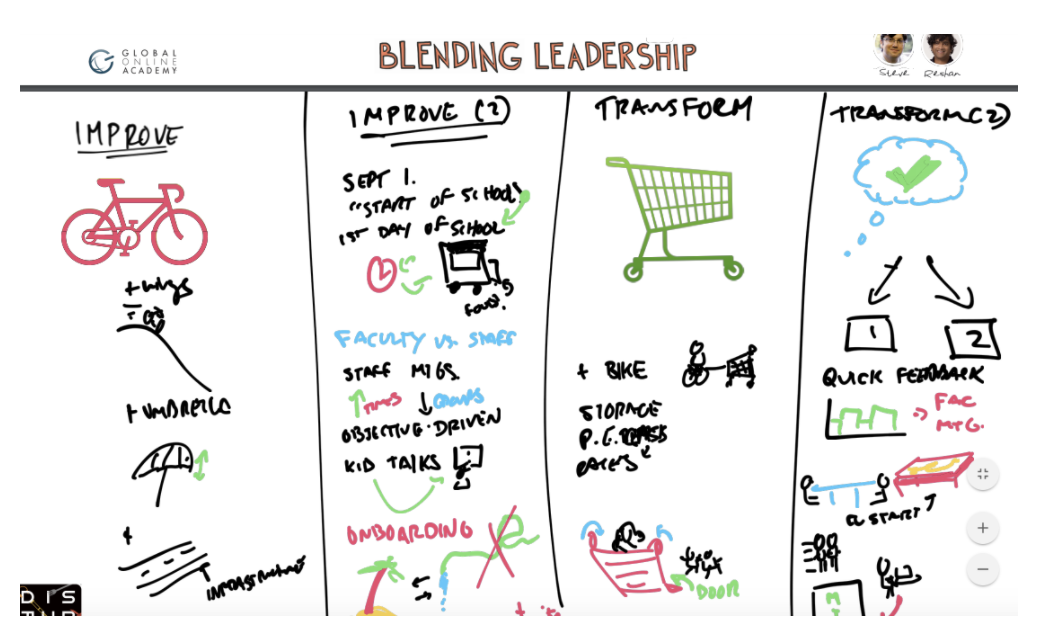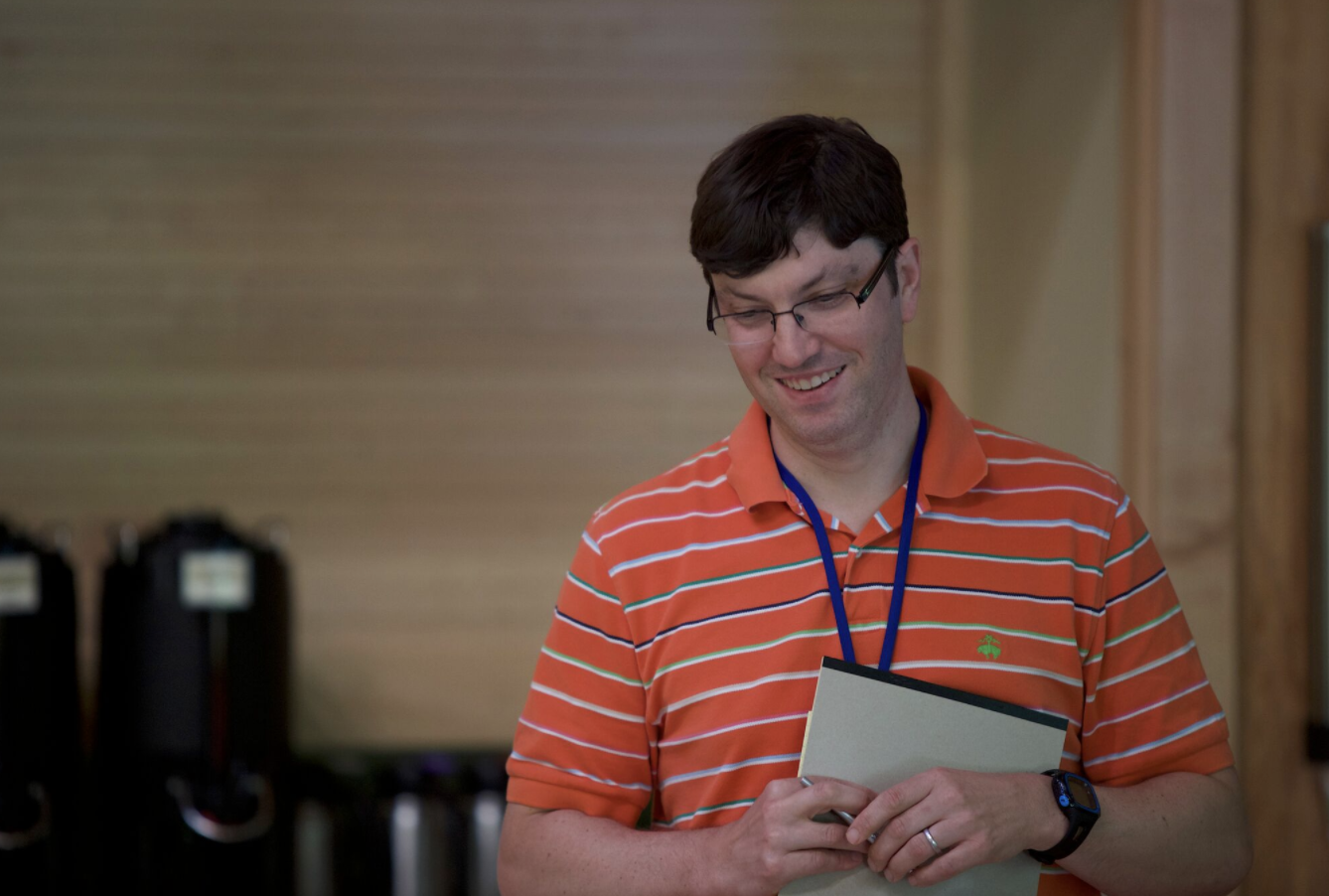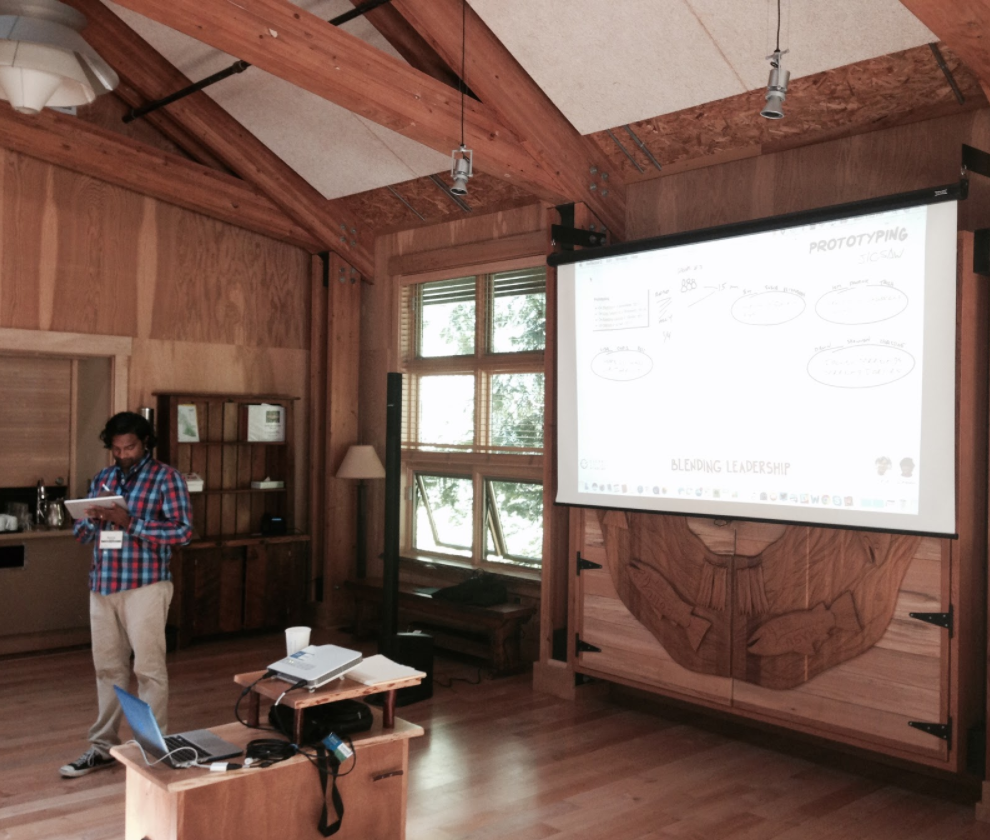Reflections on Modern Leading: 4 School Leaders on 'Blending Leadership'
By Dr. Reshan Richards and Stephen Valentine
Editor’s Note: The Blending Leadership course has been offered twice in partnership with Global Online Academy (GOA). The first course was fully online and was offered last fall through GOA’s online professional learning platform. The second iteration was an in-person Blending Leadership Institute at GOA’s summer conference in July of 2017. GOA is offering the Blending Leadership course again online this fall, which is open to education leaders in independent and public schools in the US and internationally.
We spent two amazing days this past July at a place called IslandWood, which is on Bainbridge Island near Seattle. Global Online Academy invited us to work with a group of extraordinary school leaders, and we tried to facilitate an environment where they could learn from one another, ask lots of questions, reflect on their practice, and experience new modes of leadership.
At one point, toward the middle of the second day, we asked participants to write 250 – 500 words about their experience at Islandwood. The task was deliberately open-ended. We wanted people to focus on a new insight, a new goal, a new instinct . . . something new that they had learned, could only learn, by going to the island. We’ve collected the responses from participants below.- Reshan and Steve
Jim Mahoney, Dean and College Counselor, The Blake School
In one of our first exercises as a group at the Blending Leadership conference, we were presented with images of objects and were asked, without extensive prompting, to improve or transform the object.
The first image was of a bicycle. “Improve this.” We bandied around ideas, some practical (add a water bottle holder) and some fantastical (add wings). Making improvements to an existing object, system, or even an institution has always been enticing to me. It wasn’t until a partner introduced me to the group that I heard something shared back with me that both pleased and challenged me; I like being in roles where I can make noticeable (if more micro) improvements in ways that better serve students and learning.
The second image, this time under the “transform” heading, was a shopping cart. We were more adventurous in this effort: “Make it an autonomous riding vehicle.” “Flip it upside down and make it a puppy kennel.” While we had fun with this process, I thought more about my default role in the groups and schools I’ve served, and whether my work has been solely focused on improving details instead of operating in a larger spirit of transformation.

One image created from the group’s ideas and contributions throughout the Blending Leadership sessions.
Is transformation usually not a proactive process, but a reactive one? Improving a process, a class, or even a culture isn’t nearly as challenging or gratifying as transforming it, but the reasoning and rationale matter. Is transformation a response to the forces around it changing, so that the thing is now either obsolete or even failing? Or should transformation be a courageous response to reading the winds of opportunity, and being unafraid to initiate change to arrive at a new and better vista?
I have been given the opportunity to reimagine the senior year for our students. The head of school has discerned that Blake should offer a culminating capstone experience for seniors that combines the traditional speech/talk before the community and a May program (currently two weeks away from school) that offers a student the chance to delve into an area of possible college study or even professional interest in a hands-on way.
This past year, I focused on improving the existing model. The main change was moving the sharing event into the morning when it had been at night to involve the entire community, rather than just the parents of seniors and the seniors themselves. Moving the event into the final school day went well, but I feel like it was just the beginning of a larger set of exciting transformational possibilities.
While gatekeepers and naysayers may arise along the way, most formidably my own doubts and defaults, I am excited. Blake’s senior program isn’t necessarily broken, but I am hungry to maximize the entrepreneurial challenge put before me, and to use the concepts, tools, and skills of blended leadership to disrupt my defaults and to lead the program into one that can transformed and can be transformative for the students involved.
Elizabeth Aurand Hastings, Assistant Head of School/Academic Dean, Packer Collegiate Institute
Often there is nothing better to motivate and inspire oneself as to be surrounded by passionate, engaging people from similar professional lives. The Blending Leadership Conference, held at IslandWood in Bainbridge, WA, was able to do just that for me. Embedded in 250 acres of outdoor glory, we listened, shared, and connected our professional practices while growing our skills in blending leadership.
For me, the presentations and conversations rejuvenated my passion for the utilization of technology tools to help manage and organize my professional life as well as recognized the ways in which I am already doing many things well. On the IslandWood website it is written, “Learning is a journey, one that begins with the spark of inspiration. IslandWood is that catalyst, an invitation to walk down a new path and come to a new awareness of our place in the world.” The conference seemed to embrace this mission as it literally as well as figuratively provided a space to walk down a new path and explore one’s own beliefs about how one leads and how one wants to move forward in the future.
I will take away new technology tools, organizational strategies and appreciation for the leadership in independent schools. I look forward in sharing my learning with others through implementation and modeling.
Shannon Rush, Math Department Chair and Academic Leader, Catlin Gabel
Meetings are for work that can only be done by a specific group of people in a face-to-face setting.
As I think about the work ahead of my school this next year, this statement is really guiding my thinking. By intentionally designing meeting time and space to include the right people for the conversation, we will reduce the expense – both in terms of time and money – of our meetings. I believe this will increase productivity and perceived value. Specifically, for our professional development around the mastery-based assessment, the diversity of our staff’s understanding, experience, and commitment to this change necessitates smaller group work rather than the traditional all-staff meeting. I imagine groups to either be comprised of teachers sharing common learning objective or teachers who are at a similar stage in the creation and implementation of this work. Along with thinking about who needs to be present for the work, I would like to “disrupt the norm” by introducing walking meetings or rotating meeting locations.
Whenever a meeting is not necessary, I plan to find ways to communicate with the appropriate people. One step will be to move my department and one task force to Slack, and perhaps to consider a project management service such as Trello.
Additionally, I was reminded of the value of sharing work out regularly, and I believe that this will be an essential part of our coming work. The process I design needs to model the iterative process and allow for the giving and receiving feedback. Through this sharing process, I imagine curating a list of FAQs for the greater community.
Julia Griffin, Assistant Director of the Upper School for Teaching and Learning, Hawken School
Getting to IslandWood is not easy. From the moment I woke up at 2:45 a.m. in Cleveland, the modes of transport I used included taxi, plane, another plane, light rail, a ferry, and (fittingly) a big yellow school bus. And yet once I arrived, I knew it was the place that I needed to be.
I spent every summer from birth until age 21 at a girls’ sleepaway camp in the Lakes Region of New Hampshire. The rhythms and architecture of Islandwood, a “school in the woods” complete with timber-framed dorms and a warm, welcoming dining hall, all hearkened back to those formative summers for me. Those summers were critical to the decision that I ultimately made to teach at independent schools and even to live on the bucolic campus of the day school where I teach, Hawken School outside Cleveland, Ohio. So this was just the right place for me to find myself: in the middle of the woods, as part of a cohort of 12 other leaders in education seeking better ways to lead online and off.
Over the course of these two days, a series of reflection exercises propelled me out of my habits and my comfort zone. In the opening session, for instance, Michael Nachbar, the executive director of Global Online Academy, called upon us to design our own flag to fit on a 1″ x 1.5″ sticker. As a rule-follower, but also someone far more comfortable in the world of verbal expression than visual expression, I shuddered internally and exchanged a helpless glance with my boss, seated next to me. “I like it better when I’m facilitating these kinds of activities than doing them,” I said plaintively, and began to fumble with some blue and green sharpies. How could I use meaningful symbolism to create some kind of personal emblem? Why am I here and what do I value?
As I sketched, I wanted to incorporate a compass, a symbol I have returned to often in my life as a representation of my love (and my family’s love) of travel and exploration; it’s a symbol that is, among other things, on the engagement ring my husband designed for me. But I couldn’t sketch a compass that looked anything like a compass. As the time ticked down, I faced a dilemma that felt familiar: do I double down on something that is sort of working and power through and apologize for my lack of drawing skill? Or do I step back and go in a completely different direction? I do not always have the courage to do the latter, but in this moment, the stakes for this flag exercise were (appropriately!) low enough and the environment safe enough for me to recognize that it was ok to pivot. So in the last 90 seconds, I went in a completely different direction with my design — one that clicked into place suddenly, and happily.
Sometimes the simplest revelations are the most profound: It’s good not to be too attached to the outcome and to doing it “the right way.” In order to experiment, you need the right balance of comfort and discomfort. And a different approach or lens can unlock a new insight.
The Blending Leadership course
Based on the recent book Blending Leadership and led by that book’s authors Stephen Valentine and Reshan Richards, this is a transformative learning experience — an opportunity to expand leadership capacity by building learning muscles to make learning-while-doing possible and probable for all participants as they move on in their careers. Read a testimonial from Katrina O’Connor of West Point Grey Academy in Vancouver, Canada, who participated in our online course last fall. Register and learn more here.
More details about our next Blending Leadership course:
- The course is online and asynchronous, from October 2- November 10
- Anticipate approximately 1 hour a week of involvement in an online space
- Registration is capped, so register now to guarantee your spot
- Share this opportunity with your network!
At the conclusion of this year’s Blending Leadership Institute, one participant wrote, “I’m feeling inspired and equipped with new tools to lead at my school.”
Dr. Reshan Richards is an educator, researcher, and entrepreneur. An adjunct assistant professor at Teachers College, Columbia University, Reshan is also the chief learning officer and cofounder of Explain Everything.
Stephen Valentine is an educator, school leader, writer, and serial collaborator. He serves as the assistant head, Upper School, and director of Academic Leadership at Montclair Kimberley Academy.
Global Online Academy (GOA) reimagines learning to enable students and teachers to thrive in a globally networked society. Professional learning opportunities are open to any educator. To sign up or to learn more, see our Professional Learning Opportunities for Educators or email hello@GlobalOnlineAcademy.org with the subject title “Professional Learning.” Follow us on Twitter @GOALearning. To stay up to date on GOA learning opportunities, sign up for our newsletter here.

